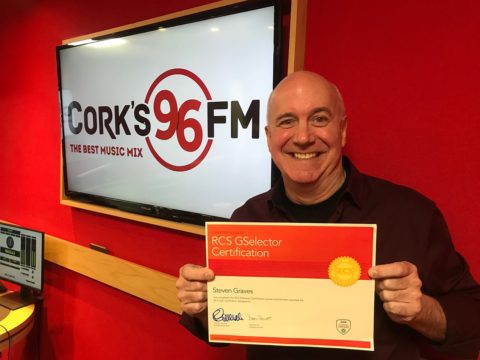“Absolutely I am a better music director after taking this course.”
If you’re like most GSelector users, you probably learned how to use the program just by playing around with it. The easy user interface makes it possible to come up to speed and begin the job of scheduling music in short order. Maybe you’ve wondered though, about the functions and tabs you never use. What do they do? Could knowing more about GSelector make you a better music programmer? Steve Haze, Music Director for Cork’s 96FM in Ireland wondered those same things. To find out, he signed up for GSelector Academy.
 Steve Haze (whose real name is Steve Graves) began his radio career in the mid-1980s. By the 90s, he had worked his way up to on-air personality ‘Hollywood Haze’ at Atlantic 252, the long wave giant that broadcast to Ireland, the UK and much of Europe on 252 kHz. He left Atlantic in 1998, joining Cork’s 96FM as music director and radio host. He had done music scheduling for Atlantic 252 with the original RCS Selector, which ran on DOS. They had a similar setup at Cork, but when that station decided to upgrade from Selector to GSelector, he decided it was time to upgrade his skills as well. “I wanted to become more familiar with the new setup and also become a better music programmer,” he explains.
Steve Haze (whose real name is Steve Graves) began his radio career in the mid-1980s. By the 90s, he had worked his way up to on-air personality ‘Hollywood Haze’ at Atlantic 252, the long wave giant that broadcast to Ireland, the UK and much of Europe on 252 kHz. He left Atlantic in 1998, joining Cork’s 96FM as music director and radio host. He had done music scheduling for Atlantic 252 with the original RCS Selector, which ran on DOS. They had a similar setup at Cork, but when that station decided to upgrade from Selector to GSelector, he decided it was time to upgrade his skills as well. “I wanted to become more familiar with the new setup and also become a better music programmer,” he explains.
Haze worked his way through the course in about eight weeks. He put in about 2-3 days a week for an hour at a time. Then, before he took the final, he went back and reviewed all the material. The self-paced format of the course was a big plus, as he explains. “Since I work full-time, I needed to work it in to free blocks of time, which vary from week to week.”
For Haze, the most difficult part of the course was the Goals section, because it has several sections. The interface part was also challenging, as Haze describes himself as not really a tech guy. Analysis was also fresh territory for Haze, and there was a lot to learn.
“When I started the course, I figured that I really know most of this stuff, but no. I learned about how much I didn’t understand as I progressed through the material,” says Haze. Many of the items covered in the Analysis section were new, as was the new additions to Library Browse and the Inline Tab function as well.
The GSelector Academy course is offered online and self-paced. It’s broken down into segments with an exam on each. Once you pass, you earn a micro-degree. When you have completed all the chapters, you can take the final exam. If you pass, you’re certified. Users typically find some modules to be easy, while others can be quite challenging. The good thing is, if you fail a module, you can take it over again.
Completing the Academy course has given Haze a different approach to programming the Hot AC formatted Cork’s 96FM. “I’m now using the legacy rules from the original Selector for some categories, and the goals from GSelector for other categories.”
And, successfully completing the course has its perks. You can order a diploma to hang on your wall, a lapel pin, and digital badge that can be used on professional sites such as LinkedIn, or attached to your e-mail. Your name and contact info are also listed in the RCS directory of ‘Super Users’, where potential employers can seek out the best and brightest.
To sum it up, Haze says, “Absolutely I am a better music director after taking this course. I’m doing things that I’ve never done before, such as the analysis. It’s giving me a better run of the music. I am also much more aware of how the system works, as well as how it can work for me. It’s been a huge help with my scheduling, and I just feel better about what I’m doing.”